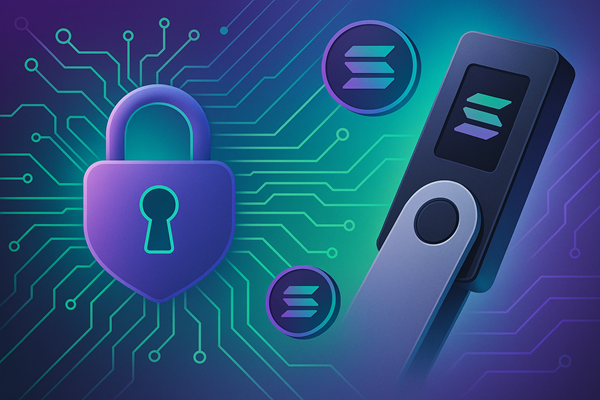Are you new to the Solana ecosystem and unsure which wallet to choose? Selecting the right wallet is the foundation of secure SOL storage and effortless interaction with decentralized applications.
Understanding Solana Wallets
A Solana wallet is the gateway to your on-chain assets by securely managing your private keys, the cryptographic credentials that authorize every transaction you initiate on Solana’s fast blockchain. When you request a transaction in your wallet interface, the wallet prepares and sends the transaction, but only your private key can approve and sign it securely. Because wallets do not store SOL directly, losing your private key or recovery seed phrase means permanent loss of access to all your tokens. To find the best Solana wallet, prioritize options with proven security processes such as offline key management and verified firmware.
Software Wallets
Software wallets are applications that run on Internet-connected devices like smartphones, desktops, or browser extensions. They excel at providing rapid access to Solana’s DeFi platforms, NFT marketplaces, and staking interfaces through intuitive UIs and built-in swap features. For example, wallets like Phantom and Solflare set beginners up in minutes, with integrated portfolio tracking and a dApp browser. However, because private keys are stored on a networked device, users must adopt stringent security practices: applying strong, unique passwords; enabling two-factor authentication; and keeping the operating system and wallet app updated to mitigate malware or phishing attacks.
Hardware Wallets
Hardware wallets generate and retain private keys within a tamper-resistant, offline Secure Element chip, completely isolating them from networked environments. To sign a transaction, you prepare it in a companion app, then connect the hardware device, review the details displayed on its screen, such as the recipient address and fee, and confirm by pressing a button. This on-device verification blocks compromised hosts from injecting malicious transactions or extracting keys. Beginners who hold significant amounts of SOL benefit from this fully offline design, which minimizes the risk of online attacks, dramatically reduces the risk of remote exploits, and provides a reliable, long-term custody solution.
Choosing the Right Wallet
Choosing the best Solana wallet depends on how you prioritize convenience versus security. If you trade frequently or experiment with dApps, a reputable software wallet offers speed and flexibility, provided you maintain strict device hygiene. A hardware wallet’s isolation is invaluable if you plan to hold SOL long-term or store large amounts. Additionally, evaluate each wallet’s ease of setup, recovery workflows (seed-phrase management), and multi-chain support to ensure it aligns with your technical comfort level and your expanding portfolio needs.
The Role of Ledger Wallet
Ledger hardware wallets have become a go-to option for beginners and experts alike thanks to their blend of audited security and user-friendly interfaces. Below are three advantages verified by independent certifications and documentation:
Verified Advantages of Ledger Hardware Wallets
- Offline Key Generation & Secure Element: All private keys are created and remain within a certified Secure Element chip, ensuring they never leave an offline, tamper-resistant environment.
- ANSSI Certification: Ledger Nano X and Stax are CSPN certified from France’s National Cybersecurity Agency, demonstrating resilience against physical tampering and sophisticated software attacks.
- Genuine Check Integrity Verification: A cryptographic bootloader authenticates firmware at startup, protecting against malicious or tampered updates.
- Secure Screen: The device’s confirmation screen is completely air-gapped and tamper-resistant, driven directly by its secure-element chip, because it never connects to the internet, no attacker can intercept or alter the transactions you approve.
Limitations: It requires an upfront purchase, you must securely record and store your seed phrase offline, and certain Ledger Live features (e.g., in-app purchases or staking) depend on regional availability.
Additional Considerations for Beginners
Beyond wallet choice, new Solana users should establish secure habits and leverage community resources. Always back up your seed phrase on durable, non-digital media, ideally in two geographically separate locations, to mitigate local risks. Engage with Solana and Ledger communities through official forums or social channels to learn best practices and troubleshoot issues. Finally, keep your hardware firmware and companion software up to date, ensuring compatibility with new Solana programs and integrating the latest security patches.
By examining security models, usability, and verified hardware credentials, you can confidently select the best Solana wallet to protect your assets and grow with your journey into decentralized finance.


